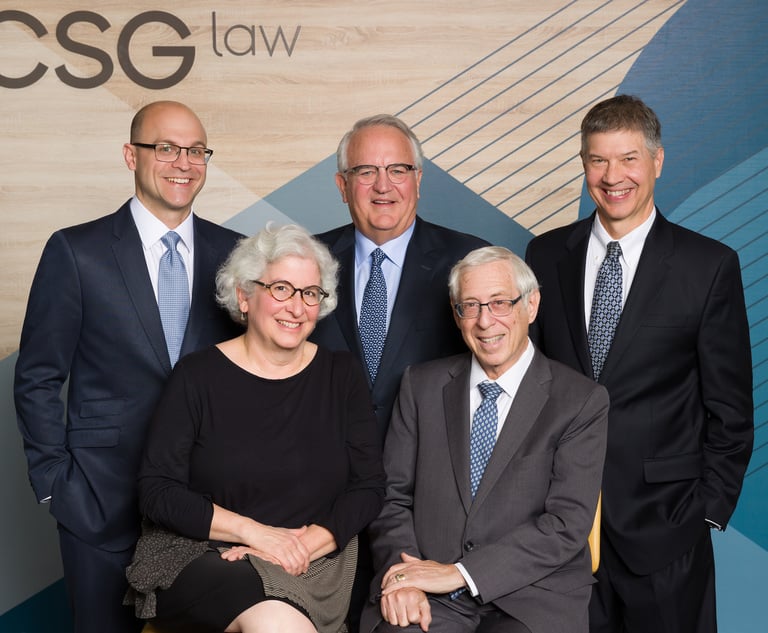 Edward Barocas, retired legal director, ACLU-NJ / Photo by Carmen Natale
Edward Barocas, retired legal director, ACLU-NJ / Photo by Carmen NataleEdward Barocas Caps Career With Government Grants Cases in 2018
"I have no intellectual problem ensuring that our proper constitutional values and protections are enforced," he said.
June 07, 2019 at 03:00 PM
5 minute read
Edward Barocas marked the conclusion of a rich and influential legal career last year when he retired as legal director of the American Civil Liberties Union's New Jersey chapter after 17 years in that role. But for Barocas, 2018 was about more than just looking back over prior work.
He was involved in two cases raising important questions of constitutional law that made their way to the New Jersey Supreme Court: One as direct counsel to litigants challenging government grants to religious educational institutions, and another as amicus in a case concerning government grants to Morris County churches for rehabilitation.
The cases obviously had practical consequences but also were important because they drew attention to nuanced differences between the the New Jersey and U.S. constitutions, Barocas said in an interview.
Barocas argued the case concerning the yeshiva and seminary, ACLU-NJ v. Hendricks, challenging more than $11 million in grants to an orthodox Jewish rabbinical school and a Presbyterian seminary.
He said the court was “very receptive” and “understood the uniqueness” of the New Jersey Constitution. But the court remanded the case to the secretary of education to conduct hearings for further fact-finding, and so that case did not garner a watershed ruling on the law of the matter (unlike the Morris County case, where the court ruled that county grants to active churches for facility rehabilitation violated the state Constitution's Religious Aid Clause and didn't run afoul of the Free Exercise Clause of the U.S. Constitution).
Having Hendricks remanded represented a step back for the ACLU-NJ, as the organization had prevailed on the merits at the Appellate Division in 2017, but a remand still is a form of “victory” in itself because it allows another opportunity to seek discovery that couldn't be obtained previously, Barocas said.
It certainly was not Barocas' first foray into New Jersey Supreme Court jurisprudence. He estimated that he has argued at the court more than a dozen times and “supervised the writing and edited the writing for scores of briefs” before the high court, he said.
“I felt a part of well more than just the ones I argued,” Barocas said. “I also enjoyed giving opportunities to our younger lawyers.”
The latter point is a mark on Barocas' career seemingly as great as or greater than any single case he has handled: His accomplishment in building up, recruiting for and developing the careers of those involved in the ACLU-NJ's legal practice. The group went from two staff attorneys and the occasional fellow in 2001, when Barocas started, to eight full-time attorneys and fellows currently, he said.
“We have hired the absolute best,” and the ACLU-NJ has become “a constant fixture” at New Jersey's high court, arguing there more often than any entity other than the state government itself, he said.
The development of the ACLU-NJ's New Jersey Supreme Court practice under Barocas' watch seems fitting, as he had a key moment earlier in his career before the court. In 1996, Barocas, then with the Public Advocate's Office, was arguing a due process point of Megan's Law in Matter of Registrant G.B. Justice Marie Garibaldi asked what the state Constitution required in the case, and Barocas, he recalled, felt “a great swell of joy that at that moment, my role as a constitutional lawyer could help clarify the law itself.”
“Clarify” is perhaps putting it too lightly. Barocas has tackled vital issues from same-sex marriage to public records access. Even before joining the organization, Barocas did work of great significance at the Office of the Public Defender, including Megan's Law cases such as Matter of Registrant G.B., and advocated for the mentally ill at the Division of Mental Health Advocacy.
The government grants cases appear a fitting capstone because they raise serious constitutional questions and require reconciliation of seemingly competing principles.
The grants at issue in Hendricks and the Morris County case “would have been a different situation if it was a building without an active ministry,” but the facilities in questions were not merely historical—but also actively religious—facilities, he said, noting that Morris County government had awarded grants to churches for years before this case arose.
Barocas said he's been asked before whether it was difficult to take a position adverse to religious institutions.
“I have no intellectual problem ensuring that our proper constitutional values and protections are enforced,” he said.
He has “no particular antipathy toward religion,” he pointed out, noting that he is the son of a yeshiva principal, and remains active in a religious summer camp operated by his family.
“In fact, we”—at the ACLU-NJ, that is—”take just as many cases protecting freedom of religion as we do against government endorsement of religion,” Barocas said.
This content has been archived. It is available through our partners, LexisNexis® and Bloomberg Law.
To view this content, please continue to their sites.
Not a Lexis Subscriber?
Subscribe Now
Not a Bloomberg Law Subscriber?
Subscribe Now
NOT FOR REPRINT
© 2024 ALM Global, LLC, All Rights Reserved. Request academic re-use from www.copyright.com. All other uses, submit a request to [email protected]. For more information visit Asset & Logo Licensing.
You Might Like
View All
Appellate Div. Follows Fed Reasoning on Recusal for Legislator-Turned-Judge
4 minute read
Chiesa Shahinian Bolsters Corporate Practice With 5 From Newark Boutique
5 minute read
'A Mockery' of Deposition Rules: Walgreens Wins Sanctions Dispute Over Corporate Witness Allegedly Unfamiliar With Company

$113K Sanction Award to Law Firm at Stake: NJ Supreme Court Will Consider 'Unsettled Law' Frivolous Litigation Question
4 minute readTrending Stories
- 1DOJ Asks 5th Circuit to Publish Opinion Upholding Gun Ban for Felon
- 2GEO Group Sued Over 2 Wrongful Deaths
- 3Revenue Up at Homegrown Texas Firms Through Q3, Though Demand Slipped Slightly
- 4Warner Bros. Accused of Misleading Investors on NBA Talks
- 5FTC Settles With Security Firm Over AI Claims Under Agency's Compliance Program
Who Got The Work
Michael G. Bongiorno, Andrew Scott Dulberg and Elizabeth E. Driscoll from Wilmer Cutler Pickering Hale and Dorr have stepped in to represent Symbotic Inc., an A.I.-enabled technology platform that focuses on increasing supply chain efficiency, and other defendants in a pending shareholder derivative lawsuit. The case, filed Oct. 2 in Massachusetts District Court by the Brown Law Firm on behalf of Stephen Austen, accuses certain officers and directors of misleading investors in regard to Symbotic's potential for margin growth by failing to disclose that the company was not equipped to timely deploy its systems or manage expenses through project delays. The case, assigned to U.S. District Judge Nathaniel M. Gorton, is 1:24-cv-12522, Austen v. Cohen et al.
Who Got The Work
Edmund Polubinski and Marie Killmond of Davis Polk & Wardwell have entered appearances for data platform software development company MongoDB and other defendants in a pending shareholder derivative lawsuit. The action, filed Oct. 7 in New York Southern District Court by the Brown Law Firm, accuses the company's directors and/or officers of falsely expressing confidence in the company’s restructuring of its sales incentive plan and downplaying the severity of decreases in its upfront commitments. The case is 1:24-cv-07594, Roy v. Ittycheria et al.
Who Got The Work
Amy O. Bruchs and Kurt F. Ellison of Michael Best & Friedrich have entered appearances for Epic Systems Corp. in a pending employment discrimination lawsuit. The suit was filed Sept. 7 in Wisconsin Western District Court by Levine Eisberner LLC and Siri & Glimstad on behalf of a project manager who claims that he was wrongfully terminated after applying for a religious exemption to the defendant's COVID-19 vaccine mandate. The case, assigned to U.S. Magistrate Judge Anita Marie Boor, is 3:24-cv-00630, Secker, Nathan v. Epic Systems Corporation.
Who Got The Work
David X. Sullivan, Thomas J. Finn and Gregory A. Hall from McCarter & English have entered appearances for Sunrun Installation Services in a pending civil rights lawsuit. The complaint was filed Sept. 4 in Connecticut District Court by attorney Robert M. Berke on behalf of former employee George Edward Steins, who was arrested and charged with employing an unregistered home improvement salesperson. The complaint alleges that had Sunrun informed the Connecticut Department of Consumer Protection that the plaintiff's employment had ended in 2017 and that he no longer held Sunrun's home improvement contractor license, he would not have been hit with charges, which were dismissed in May 2024. The case, assigned to U.S. District Judge Jeffrey A. Meyer, is 3:24-cv-01423, Steins v. Sunrun, Inc. et al.
Who Got The Work
Greenberg Traurig shareholder Joshua L. Raskin has entered an appearance for boohoo.com UK Ltd. in a pending patent infringement lawsuit. The suit, filed Sept. 3 in Texas Eastern District Court by Rozier Hardt McDonough on behalf of Alto Dynamics, asserts five patents related to an online shopping platform. The case, assigned to U.S. District Judge Rodney Gilstrap, is 2:24-cv-00719, Alto Dynamics, LLC v. boohoo.com UK Limited.
Featured Firms
Law Offices of Gary Martin Hays & Associates, P.C.
(470) 294-1674
Law Offices of Mark E. Salomone
(857) 444-6468
Smith & Hassler
(713) 739-1250






